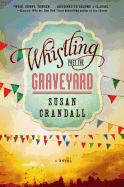
Starla Claudelle can't seem to do anything right, and her grandmother makes sure she knows it. During the summer of 1963, Starla is caught defying her punishment, and--convinced "Mamie" is sending her off to reform school this time--she decides to run away. Starla plans, as only a nine-year-old can, to find her mother, the woman who left her when she was three to become a star in Nashville. Quickly figuring out she can't walk the whole way from her small-town Mississippi home to Tennessee, Starla hitches a ride with a kind black woman traveling with a white infant. Unbeknownst to Starla, she's just bought her ticket for a trip that will help define her life.
Whistling Past the Graveyard's themes of hope, faith and innocence are plunked down in one of the nation's darkest time periods. With an exceptionally strong voice for her young spitfire narrator, Susan Crandall reminds readers that while the depth of hate was extraordinary, there were some people who used their gifts to encourage love, compassion and tolerance.
This young girl who shuns society's idea of a "lady" represents light in the darkness; with her idiosyncratic language and her brassy spunk, she is at turns humorous, endearing and heartbreaking. Through it all, she is convincing--readers won't be able to help but love and admire Starla Claudelle. With echoes of To Kill a Mockingbird and Adventures of Huckleberry Finn, Whistling Past the Graveyard is a timeless tale. In 1963 or 2013 alike, celebrating the good in others in a precious gift. --Jen Forbus of Jen's Book Thoughts

